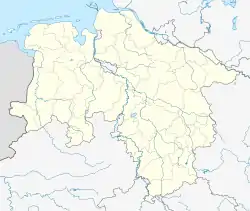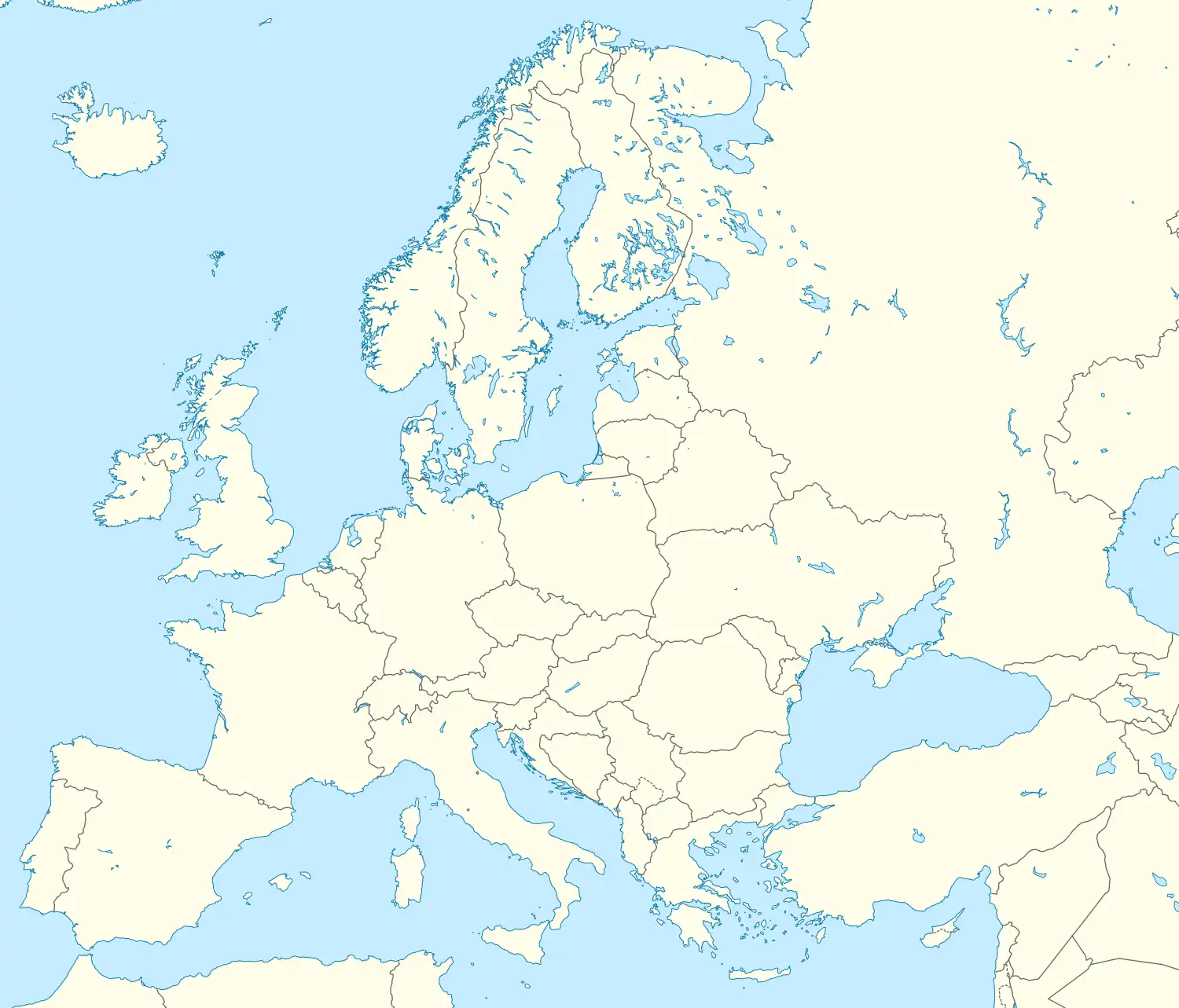Oldenburg Hauptbahnhof
Oldenburg Hauptbahnhof (originally Oldenburg Centralbahnhof) is the main passenger station in the city of Oldenburg in the German state of Lower Saxony. It is a through station, with seven platform tracks. Its large reception hall was built in the Art Nouveau style.
Oldenburg Hauptbahnhof | |||||||||||||||||||||||||||||||||||||||||||||||||||||||||||||
|---|---|---|---|---|---|---|---|---|---|---|---|---|---|---|---|---|---|---|---|---|---|---|---|---|---|---|---|---|---|---|---|---|---|---|---|---|---|---|---|---|---|---|---|---|---|---|---|---|---|---|---|---|---|---|---|---|---|---|---|---|---|
| Junction station | |||||||||||||||||||||||||||||||||||||||||||||||||||||||||||||
 Entrance of the station building | |||||||||||||||||||||||||||||||||||||||||||||||||||||||||||||
| General information | |||||||||||||||||||||||||||||||||||||||||||||||||||||||||||||
| Location | Oldenburg (Oldenburg), Lower Saxony Germany | ||||||||||||||||||||||||||||||||||||||||||||||||||||||||||||
| Coordinates | 53°08′37″N 08°13′21″E | ||||||||||||||||||||||||||||||||||||||||||||||||||||||||||||
| Owned by | Deutsche Bahn | ||||||||||||||||||||||||||||||||||||||||||||||||||||||||||||
| Operated by | DB Station&Service | ||||||||||||||||||||||||||||||||||||||||||||||||||||||||||||
| Line(s) | |||||||||||||||||||||||||||||||||||||||||||||||||||||||||||||
| Platforms | 7 | ||||||||||||||||||||||||||||||||||||||||||||||||||||||||||||
| Construction | |||||||||||||||||||||||||||||||||||||||||||||||||||||||||||||
| Architectural style | Art Nouveau | ||||||||||||||||||||||||||||||||||||||||||||||||||||||||||||
| Other information | |||||||||||||||||||||||||||||||||||||||||||||||||||||||||||||
| Station code | 4765[1] | ||||||||||||||||||||||||||||||||||||||||||||||||||||||||||||
| DS100 code | HOLD[2] | ||||||||||||||||||||||||||||||||||||||||||||||||||||||||||||
| IBNR | 8000291 | ||||||||||||||||||||||||||||||||||||||||||||||||||||||||||||
| Category | 2[1] | ||||||||||||||||||||||||||||||||||||||||||||||||||||||||||||
| Fare zone | VBN: 740[3] | ||||||||||||||||||||||||||||||||||||||||||||||||||||||||||||
| Website | www.bahnhof.de | ||||||||||||||||||||||||||||||||||||||||||||||||||||||||||||
| History | |||||||||||||||||||||||||||||||||||||||||||||||||||||||||||||
| Opened | 1915 | ||||||||||||||||||||||||||||||||||||||||||||||||||||||||||||
| Services | |||||||||||||||||||||||||||||||||||||||||||||||||||||||||||||
| |||||||||||||||||||||||||||||||||||||||||||||||||||||||||||||
| Location | |||||||||||||||||||||||||||||||||||||||||||||||||||||||||||||
 Oldenburg Location in Lower Saxony  Oldenburg Location in Germany  Oldenburg Location in Europe | |||||||||||||||||||||||||||||||||||||||||||||||||||||||||||||
It is one of two stations in Oldenburg open to passengers, the other one being the newly-constructed Oldenburg-Wechloy suburban rail station opened in 2015 in the vicinity of the University of Oldenburg. Older stations, including Ofenerdiek and Osternburg, have had their passenger service gradually removed over the course of previous decades.
History

The first railway in the capital of the Grand Duchy of Oldenburg was the line from Oldenburg to Bremen via Delmenhorst opened by the Grand Duchy of Oldenburg State Railways on 15 July 1867. On 3 September 1867, a line was opened from Oldenburg to Heppens (later renamed Wilhelmshaven), financed by the Prussian government. The line was operated by the Oldenburg State Railways, which in 1913 bought the line from Prussia, placing an enormous burden on the state's budget. On 15 June 1869, the Oldenburg–Leer line was opened. On 15 October 1875, the Oldenburg State Railways opened the Oldenburg–Osnabrück line.
The first Oldenburg station was planned to be built in today's Cäcilienplatz. In 1868, it became clear that the proposed building would be too small for the growing demand. Therefore, the project was never realized. Instead, a converted freight shed served as Oldenburg's station for twelve years.
On 21 May 1879, the Central Station was finally inaugurated as the first "real" station in Oldenburg at the site of the present station. It was a neo-Gothic building designed by the renowned architect Conrad Wilhelm Hase. It was considered one of the most romantic railway buildings in Germany.
Today's Oldenburg station was inaugurated on 3 August 1915 without much ceremony after four years of construction. The magnificent Art Nouveau building was designed by the architect, Friedrich Mettegang. A separate building was planned for the Grand Duke of Oldenburg to board trains, called Prince Hall. As part of the new building the tracks were raised by about 3.25 meters (10 ft 8 in). The building was placed at the edge of the tracks, so that the station could be rebuilt as a through station. Up to that time, travellers who wanted to continue past Oldenburg had to change trains. In 1992 the line was electrified from Oldenburg to Leer.

Connections

The station's track 1 is next to the main building and it has three Island platforms, numbered as tracks 3/4, 5/6 and 7/8. Track 2 is a through track without a platform.
| Platform | Route | Train category |
|---|---|---|
| 1 | Bremen – Hanover | Regional-Express |
| 2 (no platform) | All routes | Freight trains |
| 3 | Hanover – Leipzig or Munich, Norddeich Mole | ICE, InterCity |
| 4 | Osnabrück, Bremen | NordWestBahn |
| 5 | Wilhelmshaven, Esens | NordWestBahn |
| 6 | Leer – Emden – Norddeich Mole | InterCity, Regional-Express |
| 7 | Bremen | Regionalbahn |
| 8 | Hude, Magdeburg and other stations | Regionalbahn, InterCity, special trains |
| 9 (no platform) | Freight | Freight trains |
| 10 (no platform) | Freight | Freight trains |
Train services
The following services currently call at the station:[4]
- Intercity Express services ICE 25 Oldenburg - Bremen - Hanover - Kassel - Würzburg – Nürnberg – Ingolstadt – Munich
- Intercity services IC 56 Norddeich - Emden - Oldenburg - Bremen - Hanover - Braunschweig - Magdeburg - Leipzig / Berlin - Cottbus
The main long-distance service through Oldenburg is the IC 56 InterCity service operating at two-hour intervals to Leipzig via Hanover. In addition, Intercity-Express trains operate once a day on several routes.
Regional services are as follows as of December 2022:
| Line | Route | Frequency |
|---|---|---|
| RE 1 | Hannover Hbf – Wunstorf – Nienburg (Weser) – Verden (Aller) – Bremen Hbf – Delmenhorst – Hude – Oldenburg (Oldb) Hbf – Bad Zwischenahn – Leer – Emden Hbf – Norden – Norddeich Mole | 120 mins |
| RE 18 | Osnabrück Hbf – Bramsche – Cloppenburg – Oldenburg (Oldb) Hbf – Varel – Wilhelmshaven | 60 mins |
| RS3 | Bremen Hbf – Bremen Neustadt – Heidkrug – Delmenhorst – Hoykenkamp – Schierbrok – Bookholzberg – Hude – Wüsting – Oldenburg (Oldb) Hbf (– Oldenburg-Wechloy – Bad Zwischenahn | 60 mins |
| RS3 | Oldenburg (Oldb) Hbf – Rastede – Jaderberg – Varel (Oldb) – Sande – Wilhelmshaven | 120/180 mins (weekdays during the day) |
| RS30 | Bremen Hbf – Delmenhorst – Hude – Oldenburg (Oldb) Hbf – Oldenburg-Wechloy – Bad Zwischenahn | 60 mins |
References
- "Stationspreisliste 2023" [Station price list 2023] (PDF) (in German). DB Station&Service. 28 November 2022. Retrieved 14 December 2022.
- Eisenbahnatlas Deutschland (German railway atlas) (2009/2010 ed.). Schweers + Wall. 2009. ISBN 978-3-89494-139-0.
- "Tarifplan" (PDF). Verkehrsverbund Bremen/Niedersachsen. 1 January 2021. Retrieved 24 January 2021.
- Timetables for Oldenburg Hbf station (in German)
External links
 Media related to Oldenburg Hauptbahnhof at Wikimedia Commons
Media related to Oldenburg Hauptbahnhof at Wikimedia Commons- Track plan of Oldenburg (Oldenburg) Hbf from Deutschen Bahn site (PDF; 177,3 KB)
- Images of the old Centralbahnhof